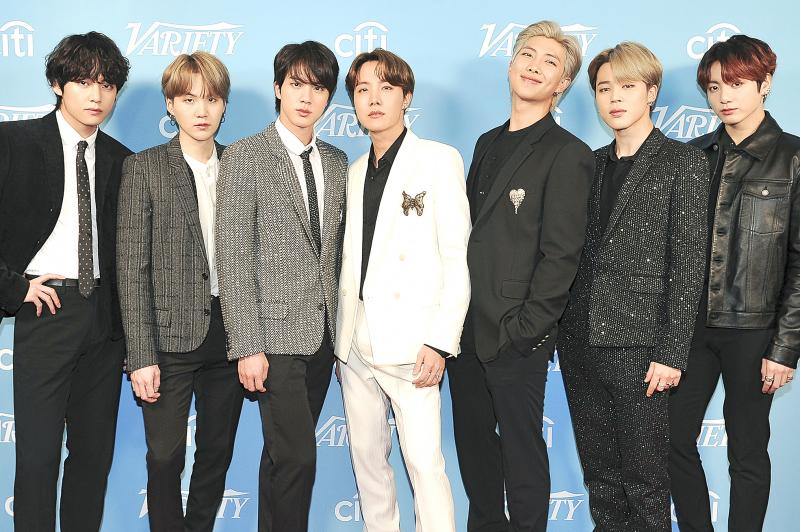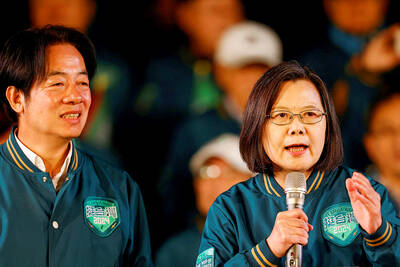BTS’s leader RM looks up from under a black baseball cap, then stares back down at his hands.
“Doing the promotional interviews, [I kept saying], ‘Music truly transcends every barrier.’ But even while I was saying it I questioned myself if I indeed believe it.”
It’s late September, and the rapper is confiding in over one million fans live from his Seoul studio. His “complex set of feelings” about the explosive, record-breaking success of Dynamite — the first fully English-language single from the South Korean megastars — is not the celebration you’d expect from a band that just topped the US Billboard Hot 100, the first K-pop act to do so. But this kind of frank, unfiltered conversation is exactly what their global “Army” fanbase love: BTS’s candid social media presence has included their fans in every step of their artistic journey, and, as they release new album Be this week, has made them the biggest pop group on the planet.

Photo: AP
Since their debut in 2013, the seven-piece boy band — rappers RM (Kim Nam-joon), Suga (Min Yoon-gi) and j-hope (Jung Ho-seok), and vocalists Jin (Kim Seok-jin), Jimin (Park Ji-min), V (Kim Tae-hyung) and Jungkook (Jeon Jung-kook) — have prioritized self-reflection in their music. Inspired by US hip-hop, they drew on RM and Suga’s reputation as underground rappers and j-hope’s credentials as a street dancer to push an emotional, rebellious image: debut single No More Dream attacked societal expectations for their generation, quipping: “What’s your dream? / Number one future career as a government official?”
Although they’ve since ditched the sleeveless shirts, heavy chains and regrettable hairstyles of their earliest years, the group’s ability to ask weighty questions of themselves remains. Inspired by philosopher Carl Jung, BTS’s most recent album Map of the Soul: 7 used seven solo tracks to showcase each member’s personal self-enquiry, from RM’s anthemic rap-rock chorus “Persona / Who the hell am I?” on the album’s opener, to Jungkook’s My Time, a neo-R&B song about swapping his childhood for his career. Black Swan, the record’s dark, theatrical single, openly discusses the possibility of falling out of love with music: in its eerie video Suga confesses, crouched low on a shadowed stage: “That would be my first death / I’ve been always afraid of.”
So it’s no surprise that RM would muse openly about music lacking transcendent power — particularly as the group’s Korean-language singles have received markedly less support from western radio stations — and speaks to how BTS’s frank examination of their own artistry has challenged standards for authenticity in pop.“I don’t know that any other K-pop idols play off authenticity as well as BTS,” says Professor Kim Suk-young, head of theater and performance studies at UCLA, and author of K-pop Live, a 2018 book exploring K-pop’s unique relationship to digital media. “What fans prize most in BTS is their stories about their authentic feelings of knowing who they really are.”
Kim adds that “K-pop idols are well known for providing excessive emotional labor” to their fans, often conveyed through elaborate meet and greets or low-key, intimate-feeling livestream conversations, and points out that BTS’s debut coincided with the mainstream popularity of useful tools including Twitter and YouTube Live. Their label Big Hit even created bespoke social media platform Weverse to facilitate closer dialogue with fans.
Moreover, the seven members have undeniable charisma. Early in their career they stopped appearing on South Korea’s popular Idol variety shows, where pop stars are sometimes put in awkward positions, to create their own version of the format: Run BTS! now has more than 100 episodes, all involving the group competing in daft, meme-generating challenges. This summer Big Hit produced a miniseries featuring the band cooking, eating, hiking and napping in a beatific lakeside cabin — and little else. No drama, no conflict, the show was designed to give fans an even greater insight into the group’s friendship. The most extreme moment? Probably when Jimin got tipsy and accidentally body-slammed a mosquito net.
Reality TV is a major part of the western pop playbook, too: Cardi B span her unfiltered appearances on Love & Hip-hop: New York into major label gold and uses Instagram to speak frankly with her fans. Ariana Grande and Taylor Swift have similarly mastered the appearance of down-to-earth realness on social media, reaping great success from it. But BTS put their own twist on these often gendered, tried-and-tested storytelling devices, emphasizing them as storytelling devices, and directly involving their fans in shaping these narratives.
“There’s no such thing as an authentic self: it’s about how you frame your story,” Kim says.

Last week Joseph Nye, the well-known China scholar, wrote on the Australian Strategic Policy Institute’s website about how war over Taiwan might be averted. He noted that years ago he was on a team that met with then-president Chen Shui-bian (陳水扁), “whose previous ‘unofficial’ visit to the US had caused a crisis in which China fired missiles into the sea and the US deployed carriers off the coast of Taiwan.” Yes, that’s right, mighty Chen caused that crisis all by himself. Neither the US nor the People’s Republic of China (PRC) exercised any agency. Nye then nostalgically invoked the comical specter

April 15 to April 21 Yang Kui (楊逵) was horrified as he drove past trucks, oxcarts and trolleys loaded with coffins on his way to Tuntzechiao (屯子腳), which he heard had been completely destroyed. The friend he came to check on was safe, but most residents were suffering in the town hit the hardest by the 7.1-magnitude Hsinchu-Taichung Earthquake on April 21, 1935. It remains the deadliest in Taiwan’s recorded history, claiming around 3,300 lives and injuring nearly 12,000. The disaster completely flattened roughly 18,000 houses and damaged countless more. The social activist and

Over the course of former President Ma Ying-jeou’s (馬英九) 11-day trip to China that included a meeting with Chinese Communist Party (CCP) leader Xi Jinping (習近平) a surprising number of people commented that the former president was now “irrelevant.” Upon reflection, it became apparent that these comments were coming from pro-Taiwan, pan-green supporters and they were expressing what they hoped was the case, rather than the reality. Ma’s ideology is so pro-China (read: deep blue) and controversial that many in his own Chinese Nationalist Party (KMT) hope he retires quickly, or at least refrains from speaking on some subjects. Regardless

Approaching her mid-30s, Xiong Yidan reckons that most of her friends are on to their second or even third babies. But Xiong has more than a dozen. There is Lucky, the street dog from Bangkok who jumped into a taxi with her and never left. There is Sophie and Ben, sibling geese, who honk from morning to night. Boop and Pan, both goats, are romantically involved. Dumpling the hedgehog enjoys a belly rub from time to time. The list goes on. Xiong nurtures her brood from her 8,000 square meter farm in Chiang Dao, a mountainous district in northern Thailand’s